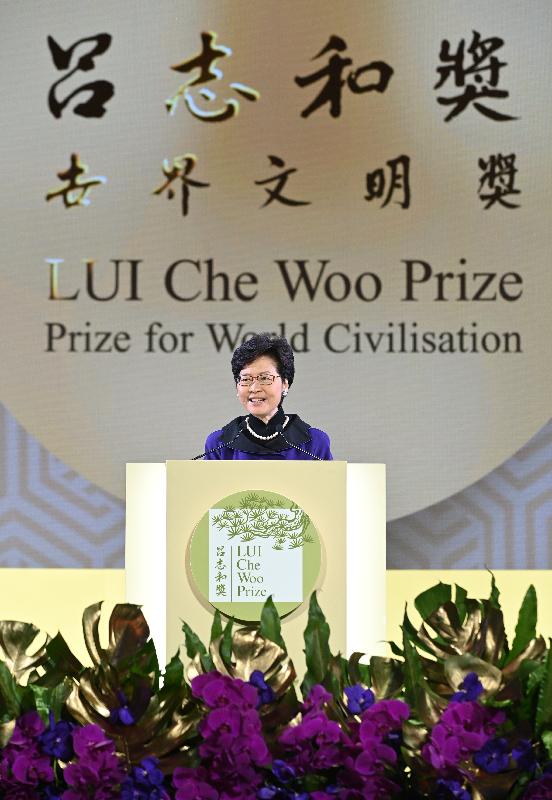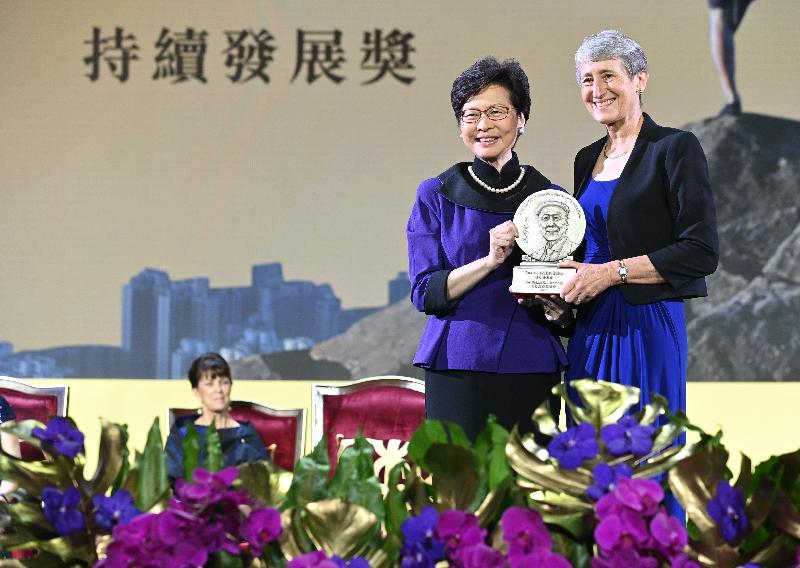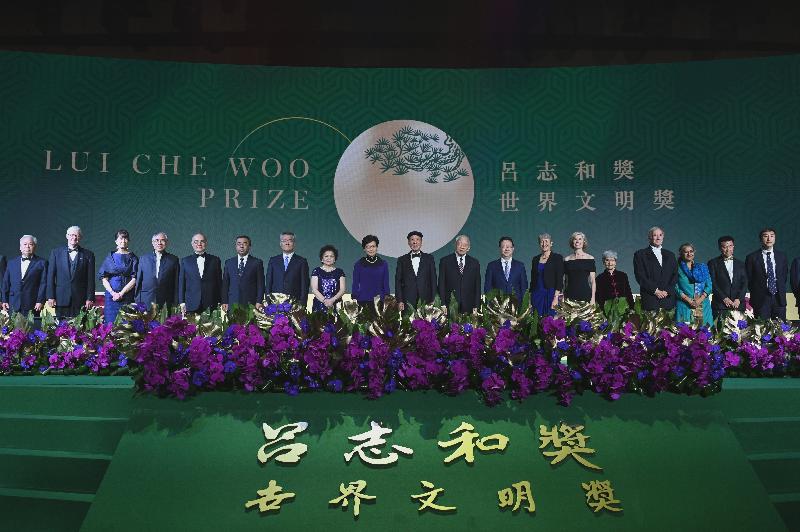Following is the speech by the Chief Executive, Mrs Carrie Lam, at the Lui Che Woo Prize – Prize for World Civilisation Prize Presentation Ceremony this evening (October 3):
Mr Tung (Vice-Chairman of the National Committee of the Chinese People's Political Consultative Conference, Mr Tung Chee Hwa), Deputy Commissioner Yang (Deputy Commissioner of the Ministry of Foreign Affairs of the People's Republic of China in the Hong Kong Special Administrative Region (HKSAR), Mr Yang Yirui), Deputy Director Tan (Deputy Director of the Liaison Office of the Central People's Government in the HKSAR, Mr Tan Tieniu), Dr Lui (Founder and Chairman of the Board of Governors cum Prize Council of the Lui Che Woo Prize, Dr Lui Che-woo), distinguished recipients of the Lui Che Woo Prize, guests, ladies and gentlemen,
Good evening. I'm pleased to join you once again for the annual presentation of the Lui Che Woo Prize – Prize for World Civilisation.
This is indeed the third time in a row that I've taken part in this prize presentation ceremony. And, I must say, it's an honour and a delight to be here, to see how splendidly the vision of Dr Lui is being realised. It is a privilege, too, to join you in celebrating those who, with their purpose and passion, so brilliantly serve a larger good.
This year's three laureates are richly deserving of their Lui Che Woo Prize: Ms Fan Jinshi, recipient of the Positive Energy Prize; Dr Jennifer Doudna, the Welfare Betterment Prize winner; and The Nature Conservancy, awarded this year's Sustainability Prize.
In particular, I am absolutely delighted to see my admirable friend, Fan Jinshi, receive the Positive Energy Prize. Known as the "Daughter of Dunhuang", Ms Fan has devoted herself to the restoration, protection and global appreciation of the Dunhuang Mogao Grottoes for over 50 years. The World Heritage site of Dunhuang harbours the largest, most remarkable repository of Buddhist art in the world, spanning more than 1000 years of irreplaceable Buddhist art in nearly 500 caves carved by hand, beginning in the fourth century.
I have become a fan of Dunhuang since I joined the late Professor Jao Tsung-I to visit the site in 2010, where I had the honour to meet Ms Fan for the first time and was deeply impressed by her dedication, especially during some very difficult working conditions in the initial period. An architect and towering presence in cultural conservation, Ms Fan led her Dunhuang Academy team to develop a digital archive of the priceless cave art. Using the latest technology, she has worked tirelessly to ensure that the wall paintings, statues and ancient architecture of Dunhuang are both preserved and accessible to scholars and the public alike. A few days ago, Ms Fan received from President Xi Jinping the National Honorary Title as an Outstanding Contributor to the Protection of Cultural Relics. It is a fitting reward for Ms Fan, and my heartfelt congratulations for her wonderful achievement.
Ms Fan is also a friend, a very good friend of Hong Kong. She is the Honorary President of the Friends of Dunhuang (Hong Kong), a non-profit organisation set up to promote the art and culture of Dunhuang. Over the years, she has come to Hong Kong many times to give lectures and share her experience in heritage conservation. Under her leadership, the Dunhuang Academy has formed a strong bond with the Hong Kong SAR Government, leading to a couple of major exhibitions on Dunhuang here in Hong Kong, which were all very well received by the people of Hong Kong. On behalf of the Hong Kong SAR Government, I take this opportunity to thank her, once again, for her wonderful friendship and support.
Last November, the University of Hong Kong was host to the Second International Summit on Human Genome Editing. The global scientific gathering included Dr Jennifer Doudna, and I'm honoured to welcome her back to Hong Kong, this time as the recipient of this year's Welfare Betterment Prize.
Dr Doudna, a professor of molecular and cell biology and chemistry at the University of California, Berkeley, has played a pioneering role in what some call the CRISPR revolution, which stands for Clustered Regularly Interspaced Short Palindromic Repeats. This trailblazing approach to genome editing, in animals and plants, is revolutionising genetics, molecular biology, medicine and much much more. Dr Doudna's scientific breakthrough, in short, offers far-reaching hope for all of us.
Hong Kong, let me add, offers far-reaching opportunity for scientists, researchers, technology experts and others looking to shape the future. My Government is committed to helping Hong Kong rise as an international innovation and technology hub. Health technology is central to that vision. We have been investing significantly in our world-class universities and research institutions. That includes budgeting US$1.3 billion to develop two research clusters at Hong Kong Science Park, one targeting healthcare technology, the other focused on artificial intelligence and robotics. In addition, the Government is committed to launching a large-scale genome sequencing project in Hong Kong in order to enhance the clinical application of genome medicine. We would certainly welcome internationally renowned scientists like Dr Doudna, as well as research institutions and technology enterprises to join us, here in Hong Kong, to help us create a future centred on innovation, technology and inclusivity.
For nearly 70 years now, The Nature Conservancy has been working to realise a world in which people and nature can thrive together in harmony. Employing a science-centred, collaborative approach, the Conservancy is both global and local in its mission and the projects it pursues.
For example, The Nature Conservancy Hong Kong is working to understand and restore shellfish reefs in Hong Kong's Deep Bay. And it's doing so with wide-ranging support from the corporate sector as well as academic and environmental institutions here. No less important, it connects with our schools and Hong Kong youth, helping build awareness, pride and responsibility in Hong Kong's environmental bounty.
I applaud this cooperative effort. Hong Kong, after all, is blessed with astonishing biodiversity. Some 40 per cent of our land is protected country parks and special areas dedicated to nature conservation. Add to that the five Marine Parks and one Marine Reserve we have created and maintain. More than a world-class financial services, trading and logistics capital, Hong Kong is actually a precious natural resource, and one my Government is determined to safeguard.
Ladies and gentlemen, the future will reward us if we work together, if we harness the spirit of Hong Kong. The Lui Che Woo Prize charitable organisation, based right here in Hong Kong, is an inspiring model for all of us. For that, my thanks to Dr Lui and all those associated with the Lui Che Woo Prize.
My congratulations once again for tonight's laureates. And I wish you all a very memorable evening. Thank you.
Follow this news feed: East Asia








